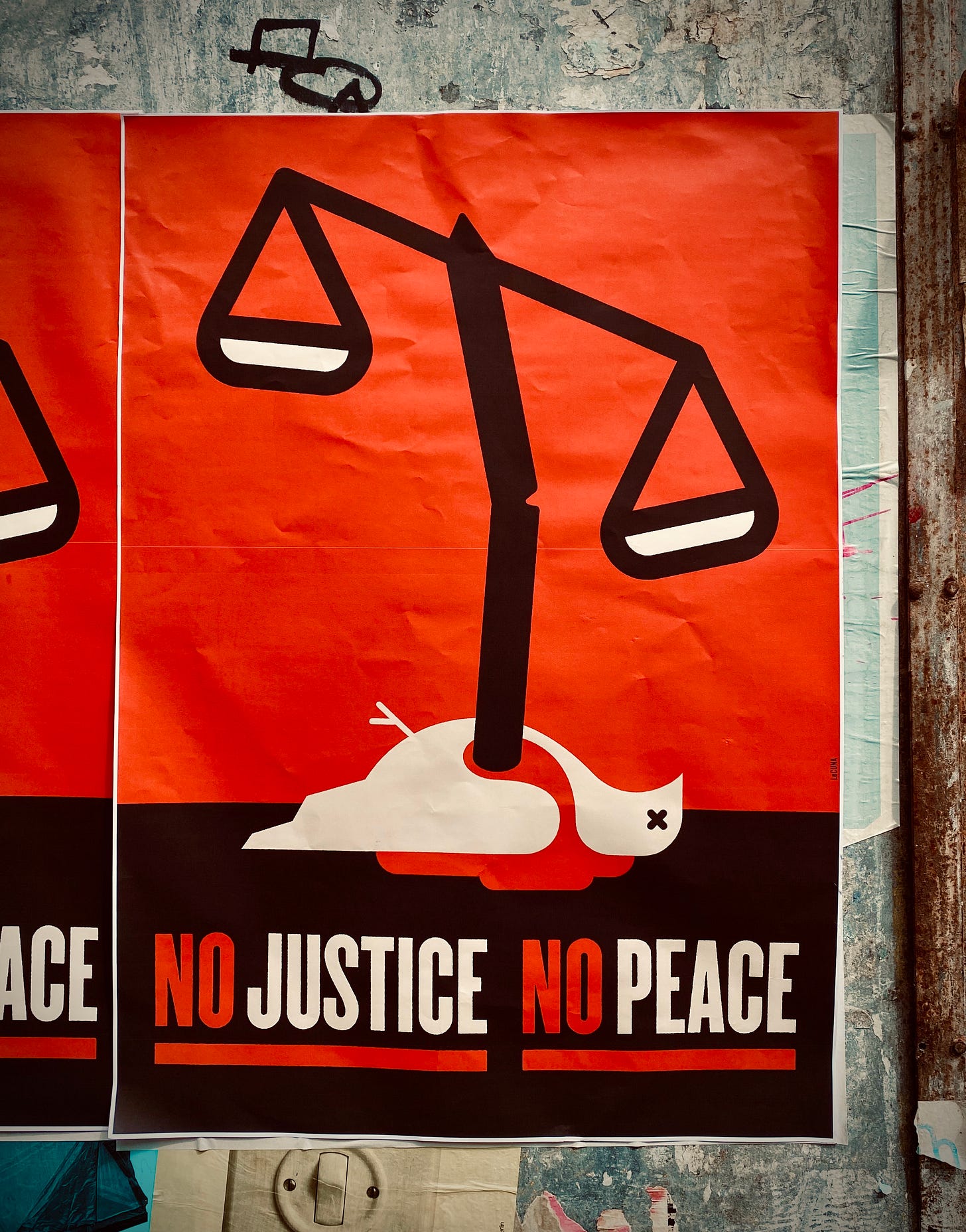Post 20: No justice, no peace! No peace, without justice!
I was asked to join a plenary panel at the Canadian Association for Food Studies (CAFS) on June 3, 2025. The panellists were given 5 minutes each to answer a question: “If you had to select just one, what key ingredient would you say that you and the organizations with which you have been involved have contributed to the formation (and re-formation) of food systems/studies across Indigenous territories and Canada?”
I enjoy creative questions like this, but I find it challenging to come up with an answer, especially when it needs to be condensed to five minutes. As academics, we are accustomed to developing our arguments in approximately 50- to 60-minute segments. I am also a slow thinker and writer. I admire my fast-thinking colleagues who can generate three quotable sentences during a press interview.
Ultimately, for my 5-minute + presentation, I selected two related concepts that all food systems require.
The first ingredient I picked was justice. Since the mid-1970s, many concepts—such as food security, food sovereignty, food justice, and food democracy have raised increasing concerns regarding the conditions of food provisioning in modern market economies.
Food justice refers to the power inequalities within the food system. It is one of those hyphenated food discourses that all others tend to agree with. ( On this topic you may want to look at my earlier postings (Saddam’s Children and Food Justice and the Origins of the Food Security Discourse).
Injustices arise not only in terms of access to food but at every stage of the food system. From slaves to victims of “man-made” famines, from plantation workers to migrant farm workers, and from Indigenous communities who are denied access to natural foods to homemakers and domestic workers who endure the drudgery of kitchen work, most suffer food injustice.
Often, individuals who face injustice do nothing, thankful that they are still better off than their neighbours. Others may view getting involved in change and speaking truth to power as too risky for their comfort. Thus, the existence of injustice does not necessarily indicate a desire to end it unless the oppressed are organized, demanding change, and the times are ripe. Getting organized to uphold the status quo is always easier and can even be rewarding. It is common for some of the oppressed to align with their oppressors, as they perceive personal gains in this. Resisting the oppressor is not easy; it requires a certain level of consciousness and conscience, and it is often associated with financial, physical, and political threats.
We often associate democracy with the rule of the people, by the people, for the people. However, democracy typically refers to majority rule in electoral systems, where the poor, the powerless, the oppressed, and the minority tend not to have a fair voice. For this reason, working for social justice necessitates organizing in political parties, labour unions, cooperatives, citizen coalitions, democratic associations, civil society organizations, and grassroots movements. Their effectiveness depends not only on their ability to mobilize but also on the historical context in which they operate. In this sense, the “times are ripe" denotes times of crisis when hegemonic powers are unable to form effective ruling coalitions or cannot halt change for some reason, and those who suffer injustice are acting as a “class for itself” as Marx argued..
The second ingredient I proposed for food systems reform is peace. During the first quarter of the 21st century, the most significant cause of rising food insecurity and deaths due to starvation has been armed conflict. Wars are terrible events. Wars destroy lives and livelihoods. They devastate the economy, the environment, and the hope for peace and development. The latest report by the United Nations Office for the Coordination of Humanitarian Affairs (OCHA) from the Occupied Palestinian Territory highlights the desperate humanitarian situation in the region. The reported Impact Snapshots from the Gaza Strip are worth noting. This is a region with an estimated 2.1 million people, one million of whom are facing emergency level, and 470,000 are facing catastrophic level food insecurity. 83% of croplands,83% of agricultural water wells and 71% of greenhouses are damaged, 72% of the fishing fleet is destroyed, and only 5% of cropland area is available for cultivation. In his COUNTERPUNCH column, Chris Hedges calls it Genocide by Starvation.
A paper by Stamatopoulou-Robbins (Oct. 2024) estimated that between Oct. 7, 2023, and Oct. 1, 2024, 53,887 direct and 67,413 indirect deaths could be attributed to the conflict in Gaza. These were slightly more conservative estimations than the 186,000 direct and indirect deaths published in an article in the Lancet in July 2024. Shockingly, an estimated 62,413 of these were due to starvation.
In 2021, a report from the Costs of War project at Brown University’s Watson Institute revealed that 20 years of post-9/11 wars have cost the U.S. an estimated $8 trillion. The report estimated that the human toll of the 20-year war was around 925,000 direct deaths and 4.6 million indirect deaths. In Afghanistan, Pakistan, Iraq, Syria, Libya, Yemen, Somalia, and the Philippines, approximately 38 million people have been displaced. These numbers do not include figures from Africa, Latin America, or South Asia.
While the impacts of these wars are worse in locations where they take place, the economic and human toll spreads like waves in the water around the world in the form of refugees, new regional conflicts, higher inflation and unemployment.
In her paper, “The Credit Card Wars” Linda Bilmes (2017) states that most of these expenses were incurred with borrowed money, and she argues that America's method of paying for the post-9/11 wars has profound implications for the conduct of public policy. These include:
Reduced transparency over the spending process
Lowered accountability for war expenditures
Weakened fiscal discipline over the defence budget
Less meaningful public debate over the wars
Transfer of the financial cost to future generations
Failure to provide resources for accrued promises to veterans
Making it easier to engage in wars and prolong them.
It is worth listening to Linda Bilmes about the costs of the Post 9/11 wars. Here is a YouTube video by the Institute for New Economic Thinking.
Next time when you complain about the rising prices of groceries, rising tuition fees, long lines in emergency rooms, problems with public transit or the number of people experiencing food insecurity at home and globally, consider what you are paying for. Wars benefit arms industries. They convince our governments, financial organizations, and pension funds that investing in their ventures makes good business sense. They never tell us that the cost of these endless wars is paid by us all, financially and morally.
No justice, no peace! No peace, without justice!





